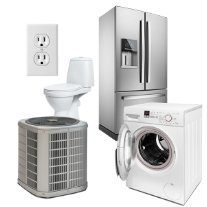If you’ve ever thought that new appliances don’t seem to last as long as they used to, it’s not just your imagination. Let’s take a look at the data behind modern appliance reliability and consider some ways you can protect yourself from unexpected repair and replacement costs.
How Long Do Modern Appliances Really Last?
Today’s appliances are equipped with a host of technological advancements that make them smarter and more energy efficient. Unfortunately, they also have a few modern characteristics that cause them to break down much sooner than their less efficient predecessors.
According to a study from The National Association of Home Builders, household appliances don’t last near as long as they used to. Dubbed the Study of Life Expectancy of Home Components, the research uncovered some troubling facts about the reduced life spans of certain home appliances.
Whether it was a dishwasher, refrigerator, or some other appliance, nearly every modern variety failed faster than similar models from the past. The closest any appliance came, in fact, was the modern gas range, which lasts an average of 15 years these days, compared to 19 years in 1993.
How Long Will My Appliances Last?
Unfortunately, it’s difficult to estimate the reliability and life span of a specific appliance, regardless of the model or brand. Companies tend to use multiple suppliers and factories for single lines of products. So, a Kenmore of 2015 could be built by a completely different factory and in a completely different country than one from 2017. What’s more, since product components may be sourced from various suppliers over a period of time, that 2015 Kenmore could have a different pump than the one from 2017.
According to the NAHB study, you should expect to replace specific appliances at the following rate:
- Food Disposer: 12 years
- Trash Compactor: 6 years
- Dishwasher: 9 years
- Faucet: 15 years
- Microwave Oven: 9 years
- Gas Range: 15 years
- Electric Range: 15 years
- Refrigerator: 13 years
Keep in mind, these figures represent estimates. Your appliances could last longer, or half as long, depending on unforeseen circumstances. Whatever the case, you can guard against expected repair costs by supplementing your manufacturers warranty with a Home Service Plan (home warranty) from 2-10 Home Buyers Warranty.
Why the Shorter Life Spans?
In addition to diverse economic factors that impact every type of durable good, there are a few key reasons why appliance lifespans are shorter than they used to be. First, the production of modern components is often outsourced to inexpensive third-party manufacturers. Second, finished appliances and their components are designed to be lighter, so they are less expensive to ship. Finally, closer fits, tighter tolerances and modern electronic controls all mean more plastic instead of metal, which leads to less durability.

What You Can Do
Since most appliances only come with a one-year manufacturer’s warranty, homeowners are often left to foot the bill for expensive appliance replacement or repair costs. A 2-10 Home Warranty can reduce the costs to repair or replace home appliances and systems, including costs related to both labor and parts. This can help you protect more and pay less.
Additionally, this coverage can apply no matter how old your systems and appliances may be. Since newer items tend to break down more quickly than older ones, it’s a good idea to cover your newer appliances with 2-10 coverage. This is especially true if you have a newer home that you may want to sell in the next few years. A 2-10 Home Warranty can help your reduce the likelihood of breakdown derailing your sale.
No matter how old your appliances are, a 2-10 Home Warranty can go a long way in protecting your budget.









